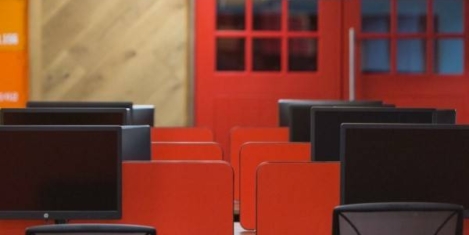May 5, 2017
Employee’s digital skills not being nurtured, despite growing need for data literacy 0
 The majority of UK employees recognise the importance of data literacy to their career progression, but half have never been offered any relevant training. Statistics from a study of over 3,000 UK employees shows they understand the growing significance of data within their organisation, with almost all (94 percent) of those surveyed stateing that they consider data to be important for performing their role. Data skills were ranked as fourth in a list of the most important skills for their job – with only traditional, ‘soft’ skills such as ‘communication’, ‘organisation’ and ‘people management’ ranking higher. Yet the Censuswide survey, commissioned by Tableau revealed that despite four in five professionals (84 percent) believing data skills will be important for their career progression and a similar percentage (83 percent) using data on a weekly basis as part of their role, nearly half (49 percent) say their employer hasn’t offered them any kind of data analytics training.
The majority of UK employees recognise the importance of data literacy to their career progression, but half have never been offered any relevant training. Statistics from a study of over 3,000 UK employees shows they understand the growing significance of data within their organisation, with almost all (94 percent) of those surveyed stateing that they consider data to be important for performing their role. Data skills were ranked as fourth in a list of the most important skills for their job – with only traditional, ‘soft’ skills such as ‘communication’, ‘organisation’ and ‘people management’ ranking higher. Yet the Censuswide survey, commissioned by Tableau revealed that despite four in five professionals (84 percent) believing data skills will be important for their career progression and a similar percentage (83 percent) using data on a weekly basis as part of their role, nearly half (49 percent) say their employer hasn’t offered them any kind of data analytics training.

















 As alarm grows in some circles over the impact of technology on future job prospects, a new survey suggests that Millennial’s jobs are likely to be at lower risk of automation. Research into how different generations choose jobs by jobs site Indeed compared the online search patterns of millions of UK jobseekers over the six months to March and found that younger people are substantially more likely to choose roles deemed to be at lower risk of automation. Nearly half of younger jobseekers were drawn to automation-resistant jobs, compared to fewer than four in 10 over-50s. These baby boomers are two thirds more likely than millennials to seek the manual jobs at highest risk of automation. While nearly half of millennials (48 percent) were searching for what economists term ‘non-routine’ roles, 61.1 percent of baby boomers were looking for ‘routine’ jobs. Routine jobs – which include sales, admin, transport and construction roles – are seen as being at higher risk of automation than non-routine work, which includes management, professional and service roles.
As alarm grows in some circles over the impact of technology on future job prospects, a new survey suggests that Millennial’s jobs are likely to be at lower risk of automation. Research into how different generations choose jobs by jobs site Indeed compared the online search patterns of millions of UK jobseekers over the six months to March and found that younger people are substantially more likely to choose roles deemed to be at lower risk of automation. Nearly half of younger jobseekers were drawn to automation-resistant jobs, compared to fewer than four in 10 over-50s. These baby boomers are two thirds more likely than millennials to seek the manual jobs at highest risk of automation. While nearly half of millennials (48 percent) were searching for what economists term ‘non-routine’ roles, 61.1 percent of baby boomers were looking for ‘routine’ jobs. Routine jobs – which include sales, admin, transport and construction roles – are seen as being at higher risk of automation than non-routine work, which includes management, professional and service roles.




 While the last 50 years have seen a notable convergence between men and women in labour force participation, hours worked, wages, and educational level, despite all this progress women are still less often found in high-paying occupations. Now a new study by Finnish economist Antti Kauhanen of the Research Institute of the Finnish Economy suggests that a substantial gender wage gap in corporate cultures emerges in early careers. In the latest IZA World of Labor report, Kauhanen cites a number of recent studies which conclude that women are much more likely than men to begin their careers at the bottom levels in the hierarchy; and this difference in initial job assignments is partly due to a divergence in educational background. Although the gender differences in years of education are small, differences in the field of education chosen remain large and are affecting career outcomes. Furthermore, in addition to educational choices and career interruptions, the hours worked, discrimination, and preferences and psychological attributes also contribute to the gender wage gap.
While the last 50 years have seen a notable convergence between men and women in labour force participation, hours worked, wages, and educational level, despite all this progress women are still less often found in high-paying occupations. Now a new study by Finnish economist Antti Kauhanen of the Research Institute of the Finnish Economy suggests that a substantial gender wage gap in corporate cultures emerges in early careers. In the latest IZA World of Labor report, Kauhanen cites a number of recent studies which conclude that women are much more likely than men to begin their careers at the bottom levels in the hierarchy; and this difference in initial job assignments is partly due to a divergence in educational background. Although the gender differences in years of education are small, differences in the field of education chosen remain large and are affecting career outcomes. Furthermore, in addition to educational choices and career interruptions, the hours worked, discrimination, and preferences and psychological attributes also contribute to the gender wage gap.













